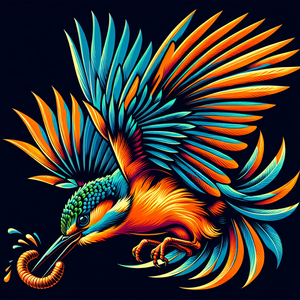The Rise of Art Entrepreneurs: How Artists are Building Their Own Brands

The rise of art entrepreneurs is rooted in a desire for independence and self-expression. Many artists are choosing to bypass traditional gallery representation, opting instead to manage their own brands. This shift has been facilitated by advancements in technology, particularly social media and e-commerce platforms, which provide artists with direct access to their audience. These tools enable artists to promote their work, engage with fans, and sell their creations without relying on third-party intermediaries. The democratization of the art world through digital platforms has empowered artists to take control of their narratives and engage directly with collectors and fans. No longer are artists confined to the walls of galleries; instead, they can showcase their work to a global audience from the comfort of their studios.
Case Studies of Successful Art Entrepreneurs
1. Jenna Kutcher: Initially a photographer, Jenna Kutcher has successfully transformed her brand into a multifaceted business that includes education, social media marketing, and a popular podcast. By leveraging her photography skills and understanding of digital marketing, she has created a thriving empire that empowers other creatives to build their brands. Her journey exemplifies how artists can diversify their offerings and establish themselves as industry leaders. 2. Kara Walker: Renowned for her thought-provoking installations and silhouettes, Walker has expanded her practice beyond traditional art forms. She collaborates with brands and engages in public art projects, blending commercial interests with her artistic vision, thereby redefining the boundaries of her work. Walker’s ability to navigate both the fine art and commercial sectors showcases the versatility required in today’s art market. 3. Banksy: Perhaps one of the most famous contemporary artists, Banksy has turned street art into a global brand. His anonymity, combined with his politically charged work, has created a massive following and significant commercial value, illustrating how an artist can harness public interest and media attention to build a brand. Banksy's unique approach demonstrates how artists can leverage controversy and social commentary to captivate audiences and drive brand recognition.
Skills for Success in Art Entrepreneurship
While creativity is a given, successful art entrepreneurs must also possess a diverse set of skills: - Marketing and Branding: Understanding how to position oneself in the market, create a personal brand, and effectively market artwork is crucial. Artists must learn to navigate social media, email marketing, and other digital platforms to reach their target audience. For instance, using Instagram strategically can help an artist build a visual portfolio and engage with potential buyers. - Financial Literacy: Managing finances, understanding pricing strategies, and recognizing the importance of budgeting are essential for sustainable growth. Artists need to be savvy about their income streams and expenses to maintain a healthy business. Knowledge of basic accounting and financial planning can help artists make informed decisions about their careers. - Networking: Building relationships with other artists, curators, and potential clients can open doors to collaborations and new opportunities. Attending art fairs, exhibitions, and networking events can be invaluable. Engaging with the art community both online and offline fosters a supportive environment where artists can learn from one another.
Practical Tips for Aspiring Art Entrepreneurs
1. Develop a Unique Brand: Find a niche that resonates with your artistic style and values. This will set you apart from the competition and attract a dedicated audience. For example, artists who focus on eco-friendly materials or social justice themes may appeal to specific demographics seeking authenticity in their purchases. 2. Leverage Online Platforms: Create an engaging online presence through social media, a personal website, or an online store. Platforms like Etsy, Instagram, and Shopify can help you reach a broader audience. Establishing a cohesive online brand can enhance visibility and customer trust. 3. Engage with Your Audience: Build a community around your work by sharing your creative process, stories, and insights. Authentic engagement can foster loyalty and encourage word-of-mouth promotion. Regularly interacting with followers can transform them into passionate advocates for your art. 4. Diversify Income Streams: Consider offering workshops, selling prints, or licensing your artwork. Diversifying your income can provide financial stability and expand your reach. For instance, offering online classes can tap into an additional market while showcasing your expertise. 5. Stay Adaptable: The art world is constantly evolving. Remaining open to new ideas, trends, and collaborations can help you stay relevant and innovative. Flexibility in your business model can allow you to pivot as necessary, responding to shifts in consumer preferences and market demands.
The rise of art entrepreneurs signifies a profound shift in the art world, where creativity meets commerce in exciting and unprecedented ways. As artists increasingly take control of their careers, they redefine not only their roles but also the very nature of art itself. By understanding the landscape, learning essential skills, and embracing the entrepreneurial spirit, artists can forge their paths, build meaningful connections, and ultimately thrive in this new era of artistic independence. Whether you're a seasoned artist or just starting your creative journey, the potential for success in art entrepreneurship is vast and full of opportunity. Embracing this new paradigm can lead to a fulfilling career that honors both artistic expression and financial viability.
Digital Marketing Specialist for Artists
Art galleries, independent artists, creative agencies
Core Responsibilities
Develop and implement digital marketing strategies to promote artists and their work across various platforms.
Create engaging content for social media, email newsletters, and websites to enhance brand visibility.
Analyze performance metrics to optimize marketing campaigns and maximize engagement.
Required Skills
Proficiency in SEO, social media marketing, and content creation.
Experience with analytics tools like Google Analytics or social media insights.
Strong communication skills and a creative mindset.
Art Sales Consultant
Art galleries, auction houses, online art platforms
Core Responsibilities
Cultivate relationships with collectors, galleries, and institutions to facilitate art sales.
Provide personalized consultation to clients regarding art selection and investment.
Organize and host exhibitions or events to showcase artists' work and drive sales.
Required Skills
In-depth knowledge of art history and current market trends.
Strong negotiation and interpersonal skills.
Experience in customer relationship management (CRM) systems.
E-commerce Manager for Art Platforms
Online art marketplaces, independent art sellers
Core Responsibilities
Oversee the online sales strategy for an art platform, including website management and user experience.
Coordinate product listings, pricing strategies, and promotional campaigns to drive online sales.
Analyze sales data to identify trends and opportunities for growth.
Required Skills
Experience with e-commerce platforms like Shopify or WooCommerce.
Strong analytical skills and familiarity with data-driven decision making.
Understanding of digital merchandising and online marketing strategies.
Art Brand Manager
Art collectives, creative agencies, and individual artists
Core Responsibilities
Develop and maintain the brand identity of an artist or art organization, ensuring consistency across all channels.
Create strategic marketing plans that align with the artist’s vision and goals.
Collaborate with designers, photographers, and other creatives to produce marketing materials.
Required Skills
Strong background in branding, marketing, and project management.
Experience with graphic design software (e.g., Adobe Creative Suite).
Excellent organizational skills and attention to detail.
Art Event Coordinator
Art galleries, cultural institutions, non-profit organizations
Core Responsibilities
Plan and execute art exhibitions, workshops, and community events that promote artists and their work.
Manage all logistical aspects of events, including venue selection, catering, and promotion.
Foster relationships with sponsors and partners to support event initiatives.
Required Skills
Strong organizational and multitasking abilities.
Excellent communication and networking skills to engage with artists and stakeholders.
Experience in event planning and budget management.


